30-Day Study Plan for English Class 12 | English Class 12 PDF Download
| Table of contents |

|
| Week 1: Foundational Understanding |

|
| Week 2: Deepening Literature and Writing Skills |

|
| Week 3: Poetry and Advanced Practice |

|
| Week 4: Revision and Exam Practice |

|
| Tips for Success |

|
The CBSE Class 12 English syllabus is designed to enhance your reading, writing, and comprehension skills while deepening your appreciation for literature. It includes two main textbooks: Flamingo (prose and poetry) and Vistas (supplementary reader), along with sections on reading comprehension and writing skills. This 30-day study plan will help you systematically cover the entire syllabus, practice essential skills, and prepare effectively for the board exams. The plan focuses on understanding themes, analysing characters, mastering writing formats, and practising past papers to ensure you’re well-prepared. Each day includes specific tasks, linked resources, and practice activities to build confidence and improve performance.
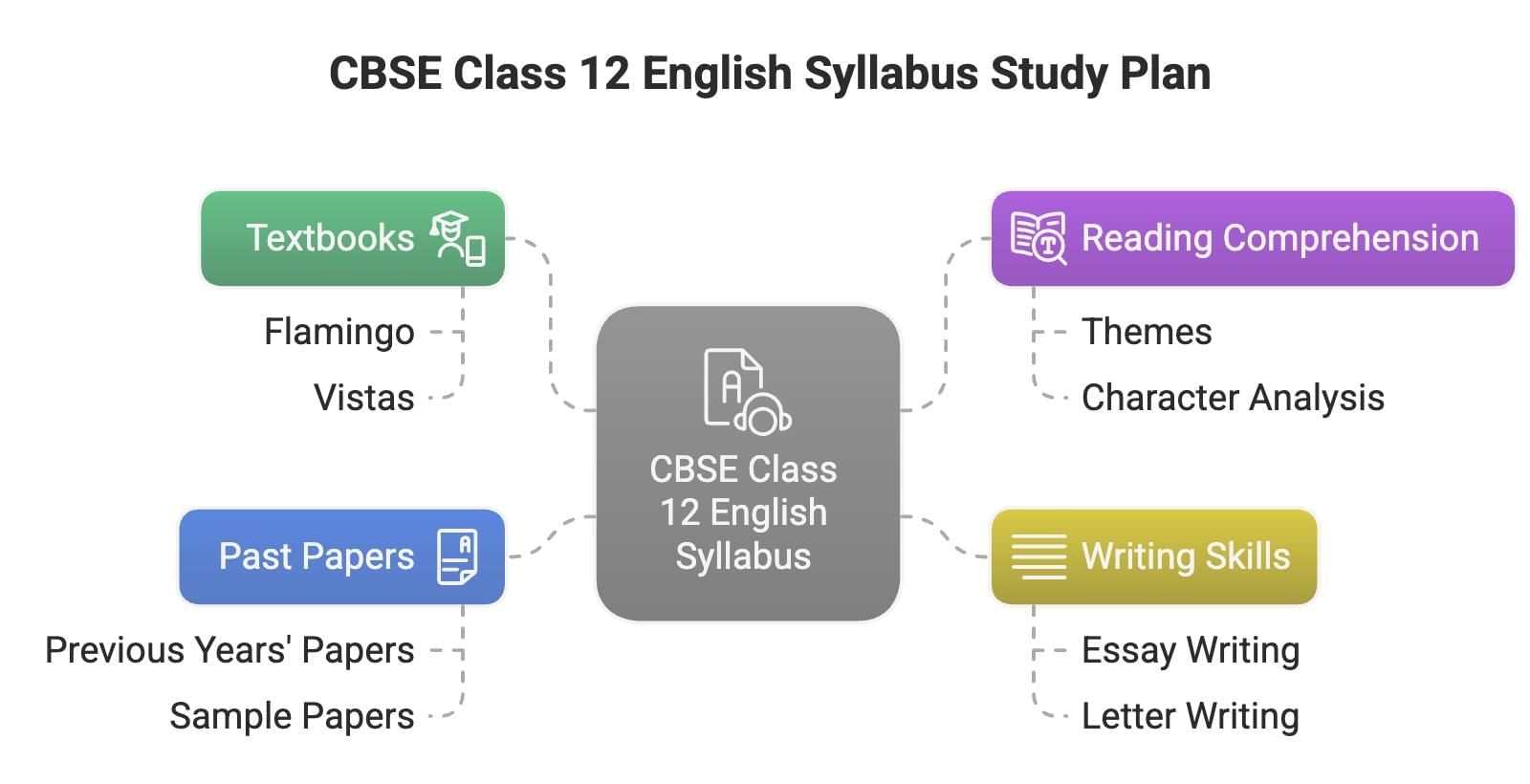
Week 1: Foundational Understanding
Day 1: The Last Lesson (Flamingo)
Begin with The Last Lesson from Flamingo. Understand the theme of language and cultural identity, and analyze the characters of Franz and M. Hamel.
- Read: NCERT Textbook - The Last Lesson
- Study: Summary - Last Lesson and Character Sketch: The Last Lesson
- Practice: Previous Year: Short Questions With Answers
Day 2: Lost Spring (Flamingo)
Study Lost Spring, focusing on the themes of poverty and exploitation. Explore the lives of Saheb and Mukesh.
- Read: NCERT Textbook - Lost Spring
- Study: Summary: Lost Spring and Character Sketch: Lost Spring
- Practice: Test: Lost Spring - 1
Day 3: The Third Level (Vistas)
Read The Third Level and understand its themes of escapism and time travel. Focus on Charley’s character and the historical context.
- Read: NCERT Textbook - The Third Level
- Study: Summary: The Third Level and Character Sketch: The Third Level
- Practice: Test: The Third Level - 1
Day 4: The Tiger King (Vistas)
Explore The Tiger King, focusing on satire and the theme of power. Analyze the Maharaja’s character and the story’s irony.
- Read: NCERT Textbook - The Tiger King
- Study: Summary: The Tiger King and Character Sketch: The Tiger King
- Practice: Test: The Tiger King - 1
Day 5: Reading Comprehension - Factual Passages
Learn how to approach factual passages. Focus on identifying key details and answering questions accurately.
- Study: How to Answer a Factual Passage
- Read: Factual Passages
- Practice: Test: Factual Passage
Day 6: Reading Comprehension - Discursive Passages
Understand discursive passages, which require critical thinking and inference. Practice answering questions based on tone and perspective.
- Study: How to Answer a Discursive Passage
- Read: Discursive Passages
- Practice: Test: Discursive Passage - 1
Day 7: Notice Writing
Learn the format and tone for writing notices. Practice drafting concise and clear notices.
- Study: Overview - How to Write Notice
- Practice: Practice: Notice Writing - 1
- Revise: Flashcards: Notice Writing
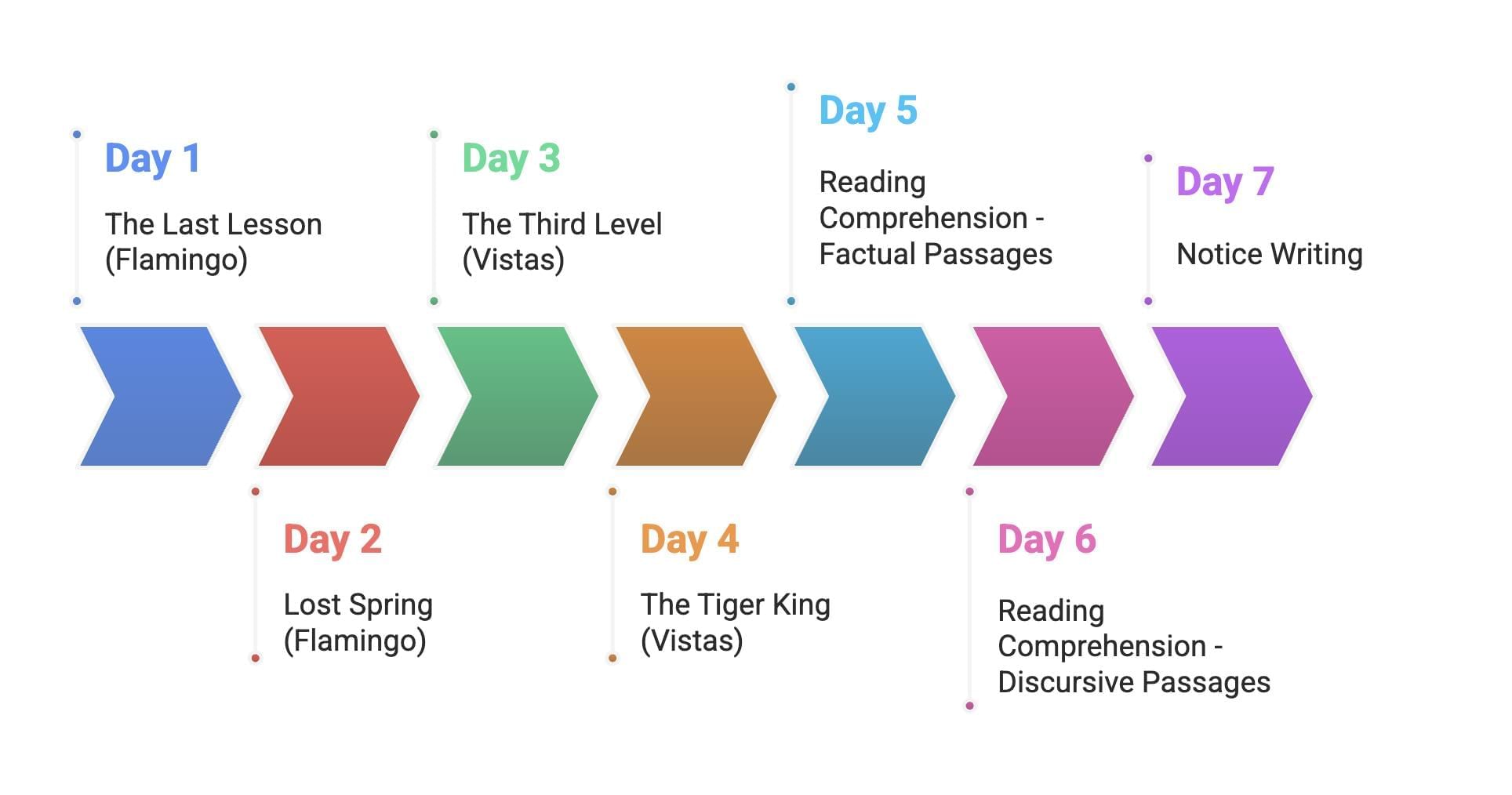
Week 2: Deepening Literature and Writing Skills
Day 8: Deep Water (Flamingo)
Study Deep Water, focusing on the theme of overcoming fear. Analyse the narrator’s psychological journey.
- Read: NCERT Textbook - Deep Water
- Study: Summary - Deep Water and Character Sketch: Deep Water
- Practice: Test: Deep Water - 1
Day 9: The Rattrap (Flamingo)
Read The Rattrap and explore its themes of human kindness and redemption. Focus on the peddler’s transformation.
- Read: NCERT Textbook: The Rattrap
- Study: Summary - The Rattrap and Character Sketch: The Rattrap
- Practice: Test: The Rattrap - 1
Day 10: Indigo (Flamingo)
Study Indigo, focusing on Gandhi’s role in the Champaran movement and themes of social justice.
- Read: NCERT Textbook - Indigo
- Study: Summary and Main Points - Indigo and Character Sketch: Indigo
- Practice: Test: Indigo - 1
Day 11: Letter Writing
Learn the formats for formal and informal letters, including letters to the editor and official letters.
- Study: How to Write a Formal Letter and Examples: Letters To The Editor
- Practice: Flashcards: Letter Writing
- Task: Write one formal and one informal letter.
Day 12: Article Writing
Understand the structure of article writing. Practice writing articles on given topics or based on visuals.
- Study: Introduction: Article Writing and How to Write an Article on a Given Topic
- Practice: Examples: Article Writing
- Task: Write one article on a social issue.
Day 13: Journey to the End of the Earth (Vistas)
Read Journey to the End of the Earth, focusing on environmental themes and the narrative style.
- Read: NCERT Textbook - Journey To The End Of The Earth
- Study: Summary: Journey To The End of The Earth and Character Sketch: Journey To The End of The Earth
- Practice: Test: Journey To The End Of The Earth - 1
Day 14: The Enemy (Vistas)
Study The Enemy, exploring themes of humanity and conflict. Analyse Dr. Sadao’s moral dilemma.
- Read: NCERT Textbook - The Enemy
- Study: Summary: The Enemy and Character Sketch: The Enemy
- Practice: Test: The Enemy - 1
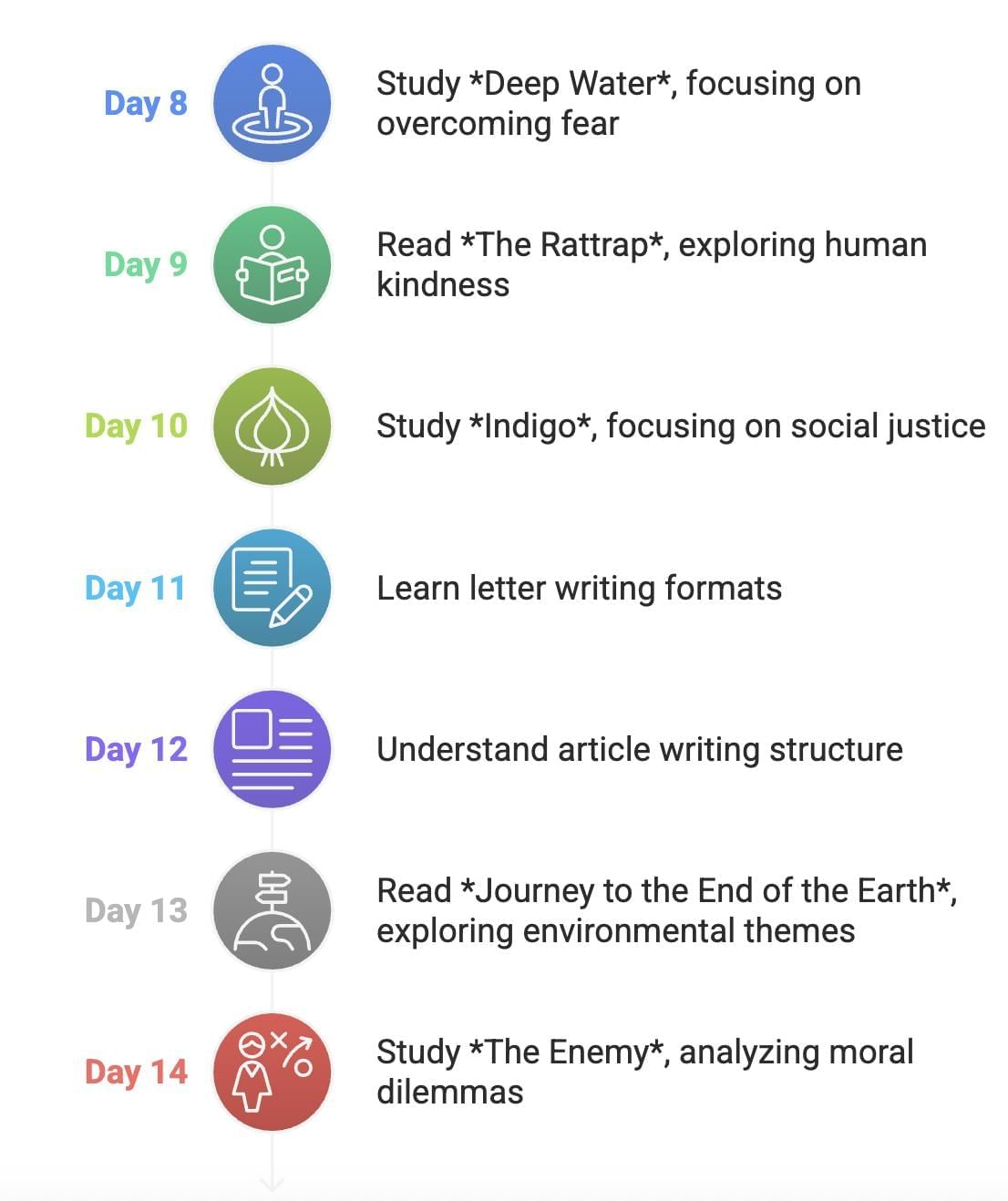
Week 3: Poetry and Advanced Practice
Day 15: My Mother at Sixty-Six (Flamingo Poetry)
Study My Mother at Sixty-Six, focusing on the theme of ageing and filial love. Analyse poetic devices.
- Read: NCERT Textbook: Poem 1 - My Mother at Sixty Six
- Study: Summary: Poem 1 - My Mother at Sixty-Six and Extract-Based Questions: My Mother at Sixty-Six
- Practice: Test: My Mother at Sixty Six - 1
Day 16: Keeping Quiet (Flamingo Poetry)
Read Keeping Quiet and explore its themes of peace and introspection. Identify literary devices.
- Read: NCERT Textbook: Poem 3 - Keeping Quiet
- Study: Summary: Poem 3 - Keeping Quiet and Extract-Based Questions: Keeping Quiet
- Practice: Test: Keeping Quiet - 1
Day 17: A Thing of Beauty (Flamingo Poetry)
Study A Thing of Beauty, focusing on the theme of eternal beauty. Analyse Keats’ use of imagery.
- Read: NCERT Textbook: Poem 4 - A Thing of Beauty
- Study: Summary: Poem 4 - A Thing of Beauty and Extract-Based Questions: A Thing of Beauty
- Practice: Test: A Thing of Beauty - 1
Day 18: A Roadside Stand (Flamingo Poetry)
Read A Roadside Stand, exploring themes of rural struggles and economic disparity. Focus on Frost’s tone and style.
- Read: NCERT Textbook: Poem 5 - A Roadside Stand
- Study: Summary: Poem - A Roadside Stand and Extract-Based Questions: A Roadside Stand
- Practice: Test: A Roadside Stand - 1
Day 19: Aunt Jennifer’s Tiger (Flamingo Poetry)
Study Aunt Jennifer’s Tiger, focusing on themes of oppression and artistic expression. Analyze symbolism in the poem.
- Read: NCERT Textbook: Poem 6 - Aunt Jennifer's Tiger
- Study: Summary and Main Points: Poem 5 - Aunt Jennifer's Tiger and Extract Based Questions: Aunt Jennifer's Tiger
- Practice: Test: Aunt Jennifer's Tiger - 1
Day 20: On the Face of It (Vistas)
Read On the Face of It, exploring themes of disability and human connection. Analyze Derry and Mr. Lamb’s relationship.
- Read: NCERT Textbook - On the Face of It
- Study: Summary: On The Face Of It and Character Sketch: On The Face Of It
- Practice: Test: On The Face Of It - 1
Day 21: Memories of Childhood (Vistas)
Study Memories of Childhood, focusing on themes of cultural identity and discrimination. Compare the two narratives.
- Read: NCERT Textbook - Memories of Childhood
- Study: Summary: Memories of Childhood and Character Sketch: Memories of Childhood
- Practice: Test: Memories of Childhood - 1
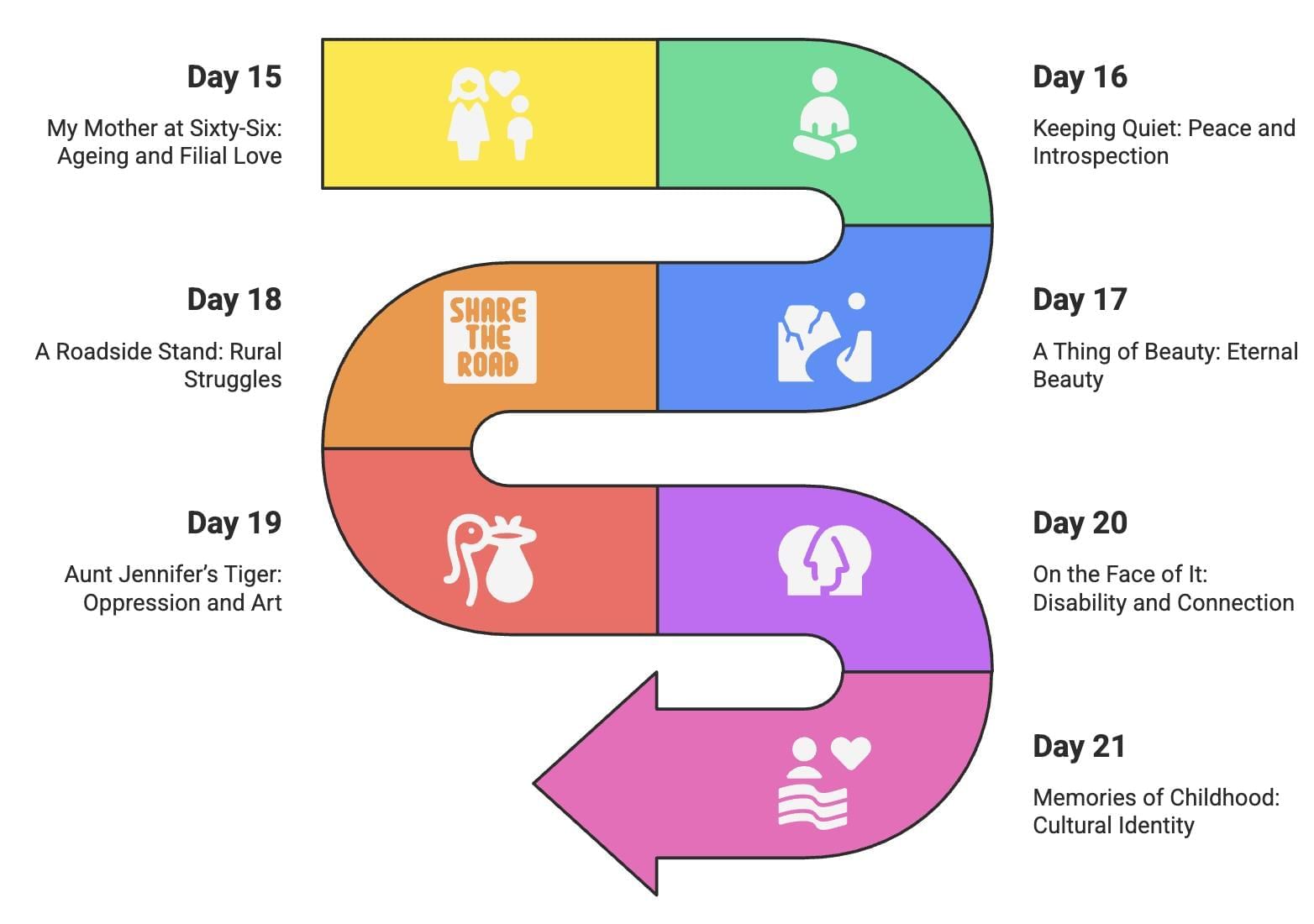
Week 4: Revision and Exam Practice
Day 22: Poets and Pancakes (Flamingo)
Read Poets and Pancakes, focusing on the theme of creativity in the film industry. Analyze key characters.
- Read: NCERT Textbook - Poets And Pancakes
- Study: Summary: Poets And Pancakes and Character Sketch: Poets And Pancakes
- Practice: Test: Poets And Pancakes - 1
Day 23: The Interview (Flamingo)
Study The Interview, exploring the theme of media influence. Analyze Umberto Eco’s perspective.
- Read: NCERT Textbook - The Interview
- Study: Summary: The Interview and Character Sketch: The Interview
- Practice: Test: The Interview - 1
Day 24: Going Places (Flamingo)
Read Going Places, focusing on themes of dreams and reality. Analyze Sophie’s character and aspirations.
- Read: NCERT Textbook - Going Places
- Study: Summary - Going Places and Character Sketch: Going Places
- Practice: Test: Going Places - 1
Day 25: Report Writing
Learn the format for report writing. Practice drafting reports for school or newspaper contexts.
- Study: Report Writing and Extra Notes: Report Writing
- Task: Write one school report and one newspaper report.
Day 26: Previous Year Papers
Solve previous year papers to familiarize yourself with the exam pattern and question types.
- Practice: Class 12 English Question Paper Solved (2024) - 1
- Practice: Class 12 English Question Paper Solved (2023) - 1
Day 27: Full-Length Mock Test
Take a full-length mock test covering all sections (reading, writing, literature) to simulate exam conditions.
- Practice: Class 12 English: CBSE Sample Question Papers (2024-25)
- Task: Time yourself (3 hours) and review mistakes.
Day 28: Revise Weak Areas
Focus on revising topics or writing formats where you faced difficulties in the mock test. Use mind maps for quick review.
- Revise: Mind Map: Flamingo PROSE
- Revise: Mind Map: Flamingo Poetry
Day 29: Final Revision
Review key summaries, character sketches, and writing formats using flashcards and mind maps.
- Revise: Flashcards: The Third Level and Flashcards: Poem - My Mother at Sixty Six
- Revise: Mind Map: Vistas
Day 30: Final Mock Test
Take another full-length mock test. Focus on time management and accuracy. Finally, relax and avoid studying new topics.
- Practice: Class 12 English Official Sample Question Paper (2023-24)
- Task: Review performance and build confidence for the exam.
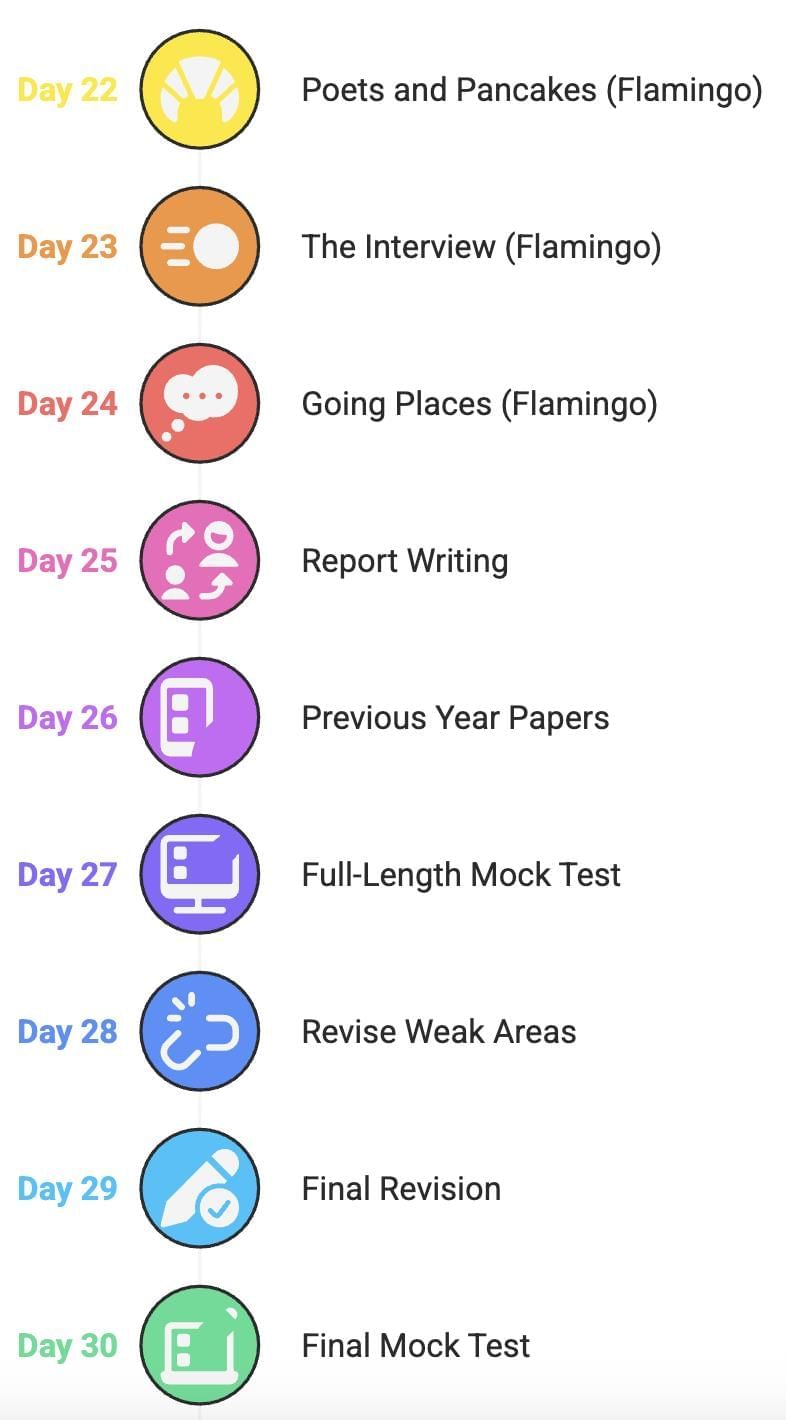
Tips for Success
- Read Actively: Highlight key themes and literary devices while reading texts to aid retention.
- Practice Writing: Regularly practice notices, letters, articles, and reports to master formats and improve speed.
- Analyse Past Papers: Review previous year papers to understand question patterns and prioritise important topics.
- Use Visual Aids: Leverage mind maps and flashcards for quick revision of themes and characters.
- Time Management: Practice completing reading comprehension and writing tasks within the allotted time.
- Focus on Extracts: Practice extract-based questions to improve textual analysis and answer precision.
- Stay Calm: Take short breaks to avoid burnout and maintain a positive mindset before the exam.
|
29 videos|317 docs|82 tests
|
FAQs on 30-Day Study Plan for English Class 12 - English Class 12
| 1. What are the key focus areas in the foundational understanding week of the study plan? |  |
| 2. How can students enhance their literature and writing skills during the second week of the study plan? |  |
| 3. What types of poetry and advanced practices are included in the third week of the study plan? |  |
| 4. What strategies should students adopt during the revision and exam practice week? |  |
| 5. How can students ensure success in their English exam preparation according to the study plan? |  |














